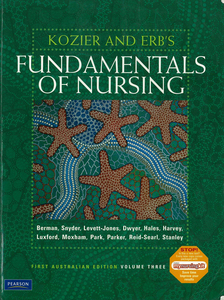Spirituality
Wicking, Kristin (2010) Spirituality. In: Berman, Audrey, Snyder, Shirlee J., Kozier, Barbara, Erb, Glenora, Levett-Jones, Tracy, Dwyer, Trudy, Hales, Majella, Harvey, Nichole, Luxford, Yoni, Moxham, Lorna, Park, Tanya, Parker, Barbara, Reid-Searl, Kerry, and Stanley, David, (eds.) Kozier and Erb's Fundamentals of Nursing. Pearson Australia, Frenchs Forest, NSW, Australia, pp. 1098-1117.
![[img]](https://researchonline.jcu.edu.au/16186/1.hassmallThumbnailVersion/16186_Wicking_2010_Book_Cover.jpg)
|
Image (JPEG) (Book Cover)
- Cover Image
Download (2MB) |
|
|
PDF (Published Version)
- Published Version
Restricted to Repository staff only |
Abstract
For years Kozier & Erb’s Fundamentals of Nursing has been the gold standard in helping students embarking on their nursing careers. This first Australian edition retains many of the features that have made this textbook the number-one choice of nursing students and lecturers.
To further enhance this popular fundamentals textbook and ensure its appropriate application for Australian students, nursing academics from across Australia were invited to review and comment on each of the 52 chapters. Their detailed feedback has ensured that Kozier & Erb’s Fundamentals of Nursing: First Australian Edition is a current, engaging and uniquely Australian textbook that will help students succeed in their nursing studies.
Kozier and Erb’s Fundamentals of Nursing, First Australian Edition presents the fundamentals of nursing care within the framework of the nursing process. This text offers an accessible writing style; a focus on practical application with real-world Australian examples and case studies; appropriate Australian terminology, policies and procedures, Australian visuals; an integrated approach to Australian Indigenous health issues; and up-to-date references, research and codes of practice, with reference to ANMC guidelines. The text is supported by a state-of-the art technology package to enhance the learning process.
Chapter 41: Because nurses provide holistic care, they care not only for the physical body and mind but also for the client's spirit. Meeting the client's spiritual needs can decrease suffering and aid in physical and mental healing. 'Spirituality permeates life, shapes our life journey and is vital to the process of discovering purpose, meaning and inner strength' (Dossey, Keegan & Guzzetta 2005, p.48). We cannot claim to achieve holistic care for our patients without nurturing their spirit, a truth that is emphasised by noting that the 'words healing, whole and holy derive from the same root: Old Saxon hal, meaning whole. This suggests that, by its nature, healing is a spiritual process that attends to the wholeness of a person' (Dossey, Keegan & Guzzetta 2005, p. 50), thus making spirituality the very foundation of holistic nursing. To implement spiritual care, nurses need to be skilled in establishing trusting nurse-client relationships. Such spiritual caregiving skill requires that the nurse possess a healthy spiritual self-awareness. This personal spirituality, inevitably, influences nursing care. In particular, this spiritual self-awareness will help the nurse to identify and be empathic towards the spiritual concerns of clients. In addition to spiritual self-awareness, nurses need some awareness of the diverse spiritual beliefs and practices that their clients may possess. Because spiritual beliefs and practices are coping resources for persons; understanding how such beliefs and practices help or hinder a client's health is vital. A client's experience with what is seen as sacred or divine is complex and individual. Thus, each client needs to be approached in light of these unique needs. In addition to distressing spiritual or religious needs, many clients have spiritual strengths that the nurse can nurture. Whether the client presents with a need to relieve spiritual distress or to enhance spiritual health, nurses can implement spiritual care therapeutics that promote spiritual and emotional health, help with coping and adjustment, or assist one to face a more peaceful death.
LEARNING OUTCOMES - Define the concepts of spirituality and religion as they relate to nursing and health care. - Identify characteristics of spiritual health. - Identify factors associated with spiritual distress and manifestations of it. - Describe the spiritual development of the individual across the lifespan. - Describe the influence of spiritual and religious beliefs about diet, dress, prayer and meditation and birth and death on health care. - Assess the spiritual needs of clients and plan nursing care to assist clients with spiritual needs. - Describe nursing interventions to support clients' spiritual beliefs and religious practices. - Identify desired outcomes for evaluating the client's spiritual health.
| Item ID: | 16186 |
|---|---|
| Item Type: | Book Chapter (Teaching Material) |
| ISBN: | 978-1-4425-0471-4 |
| Keywords: | agnostic, atheist, faith, halal, holy day, hope, kosher, meditation, monotheism, polytheism, prayer, presencing, religion, spiritual distress, spiritual health, spiritual wellbeing, spirituality, transcendence |
| Date Deposited: | 27 Apr 2011 01:25 |
| FoR Codes: | 11 MEDICAL AND HEALTH SCIENCES > 1110 Nursing > 111099 Nursing not elsewhere classified @ 100% |
| SEO Codes: | 92 HEALTH > 9202 Health and Support Services > 920210 Nursing @ 100% |
| Downloads: |
Total: 246 Last 12 Months: 3 |
| More Statistics |



